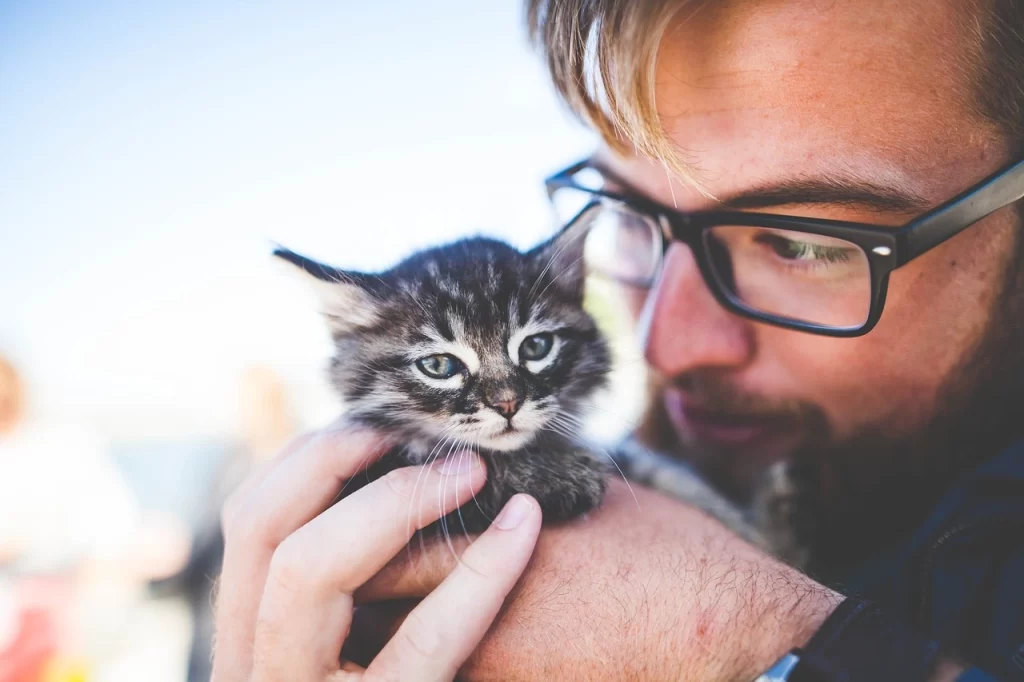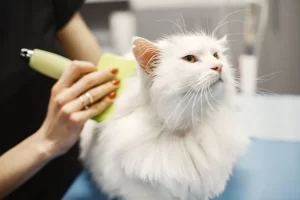If you’re a cat owner, keeping your feline friend safe and secure is a top priority. That’s why it’s important to have a cat safety checklist in place to ensure you’re taking all the necessary precautions to protect your cat from potential hazards in your home. From securing your windows and balcony to keeping an emergency kit on hand, there are a variety of measures you can take to safeguard your cat’s well-being. In this article, we’ll cover 25 essential safety tips for cat owners to help you create a comprehensive cat safety checklist. By following these tips, you can keep your cat happy, healthy, and safe for years to come.
Presented below are the crucial safety tips that you should always keep in mind or have readily accessible:
Table of Contents
ToggleProvide a safe and comfortable living environment
Cats are territorial animals and need a space where they can feel safe and secure. Providing a comfortable living environment for your cat can help reduce stress and anxiety, and create a happy and healthy living situation. Cats love to climb and explore, so consider providing a cat tree or perch where they can observe their surroundings. Cats also need plenty of hiding places, so provide them with a cozy bed, tunnel, or box where they can retreat when they need some alone time. It’s important to keep your cat’s living area clean and free from hazards such as toxic plants, sharp objects, and electrical cords. Make sure to secure any loose wires or cords to prevent your cat from chewing on them, and keep cleaning products and other hazardous items out of reach. Check out the full list of home remedies to lower stress in your cat.
Ensure proper nutrition
Providing your cat with a balanced and nutritious diet is essential for its health and well-being. Cats are obligate carnivores and require a diet rich in animal protein. Make sure to choose high-quality cat food that meets your cat’s nutritional needs, and avoid feeding your cat human food or dog food, which may not meet its specific nutritional requirements. It’s also important to provide your cat with fresh water at all times and to clean their food and water bowls regularly. If you have a multi-cat household, make sure each cat has their own food and water bowl to prevent competition and reduce stress.
Keep them up to date on vaccinations and vet visits
Regular visits to the veterinarian and vaccinations are essential for keeping your cat healthy and preventing illness. Cats should receive their first set of vaccinations at 6-8 weeks of age, with booster shots are given every 3-4 weeks until they are 16 weeks old. After that, cats should receive annual vaccinations to maintain their immunity. Regular check-ups with your vet can help catch any health problems early, and routine dental care can help prevent dental disease. Make sure to keep track of your cat’s vet appointments and any necessary medications, and seek veterinary care immediately if you notice any signs of illness or injury.
Read more on How often should I take my cat to the vet?
Provide mental and physical stimulation
Cats are curious and intelligent animals that need mental and physical stimulation to stay happy and healthy. Providing toys, scratching posts, and interactive playtime can help keep your cat entertained and engaged. Toys that mimic natural prey, such as balls, feathers, and toy mice, can help satisfy your cat’s hunting instincts. Scratching posts and cat trees can help keep your cat’s claws healthy and provide a place for them to climb and explore. Interactive playtimes, such as playing with a wand toy or laser pointer, can help strengthen your bond with your cat and provide them with much-needed exercise.
Keep hazardous items out of reach
Cats are curious creatures and can get into trouble easily. Make sure to keep hazardous items such as toxic plants, cleaning products, and sharp objects out of reach. Common household plants such as lilies, ivy, and aloe vera can be toxic to cats, so make sure to research any plants you have in your home to ensure they are safe for your feline friend. Chemicals such as cleaning products, pesticides, and antifreeze should be stored in a secure location that your cat cannot access. Sharp objects such as scissors, knives, and needles should also be kept out of reach to prevent injury.
Practice good grooming
Regular grooming is essential for your cat’s health and well-being. Cats groom themselves regularly, but they still need help from their owners to maintain their coats and claws. Brushing your cat’s fur regularly can help prevent hairballs and keep its coat shiny and healthy. Clipping your cat’s claws regularly can also help prevent them from becoming too long and causing discomfort. It’s also important to clean your cat’s ears and teeth regularly. Use a soft, damp cloth to clean the outer ear, but do not insert anything into the ear canal as this can cause injury. Brushing your cat’s teeth with a cat-specific toothbrush and toothpaste can help prevent dental disease.
Provide a safe outdoor environment
Cats love to explore the outdoors, but it can be dangerous for them if they are not supervised. If you allow your cat to go outside, make sure to provide a safe and secure outdoor environment. Consider building a cat enclosure or “catio” where your cat can enjoy the outdoors without the risk of escaping or encountering other animals. If your cat is allowed to roam freely outside, make sure they are microchipped and wearing a collar with identification tags. Keep your cat’s vaccinations up to date and be aware of any potential hazards in your neighborhood, such as busy roads, toxic plants, or other animals.
Keep them away from dangerous foods
Some foods that are safe for humans can be toxic to cats. Make sure to keep dangerous foods out of reach, such as chocolate, caffeine, onions, garlic, grapes, and raisins. These foods can cause serious health problems such as vomiting, diarrhea, and even death. Make sure to also avoid giving your cat bones, as they can splinter and cause injury or obstruction in your cat’s digestive system.
Provide a comfortable and safe carrier
A comfortable and safe carrier is essential for transporting your cat to the vet or other locations. Choose a carrier that is the right size for your cat and that provides enough ventilation and visibility. Place a soft blanket or towel in the carrier for comfort and security. Practice getting your cat used to the carrier by leaving it out in your home and encouraging your cat to explore it. This can help reduce stress and anxiety when it’s time to use the carrier.
Keep them away from electrical cords
Cats love to chew on things, and electrical cords can be a serious hazard. Make sure to secure any loose cords or wires and keep them out of your cat’s reach. Consider using cord covers or hiding cords behind furniture to prevent your cat from accessing them. If your cat does chew on an electrical cord, seek veterinary care immediately, as this can cause serious injury or even death.
Provide a comfortable and safe litter box
A comfortable and safe litter box is essential for your cat’s health and well-being. Choose a litter box that is the right size for your cat and that is easy for them to access. Make sure to keep the litter box clean and free from odor by scooping it daily and changing the litter weekly. If you have multiple cats, provide each cat with its own litter box to prevent competition and reduce stress.
Keep them away from toxic household items
Many household items can be toxic to cats, including cleaning products, medications, and certain plants. Make sure to store these items in a secure location that your cat cannot access. If you suspect your cat has ingested a toxic substance, seek veterinary care immediately. Signs of toxicity include vomiting, diarrhea, lethargy, and seizures.
Provide proper identification
Proper identification is essential for ensuring your cat’s safe return if they become lost. Make sure your cat is microchipped and wearing a collar with identification tags that include your name and contact information. Keep your contact information up to date with the microchip company and update your cat’s tags if your contact information changes. It’s also a good idea to include your cat’s name and a secondary phone number on their collar in case the primary number is not reachable.
Keep toxic plants out of reach
Many common plants can be toxic to cats if ingested. Some of the most common toxic plants include lilies, azaleas, tulips, and daffodils. Make sure to keep these plants out of reach or consider removing them from your home if you have a curious cat. You can also provide your cat with safe, cat-friendly plants to chew on, such as catnip or cat grass.
Protect them from extreme temperatures
Cats are susceptible to heatstroke and hypothermia just like humans are. Make sure to provide your cat with a comfortable indoor environment and keep them out of extreme temperatures. If your cat must spend time outdoors, make sure they have access to shade and plenty of water in hot weather, and provide them with a warm shelter and blankets in cold weather.
Keep them away from small objects
Small objects such as toys, buttons, and rubber bands can be hazardous if ingested by cats. Make sure to keep small objects out of reach and supervise your cat when they are playing with toys. If you suspect your cat has swallowed a small object, seek veterinary care immediately.
Provide plenty of attention and playtime
Cats are social creatures and need plenty of attention and playtime to stay happy and healthy. Make sure to spend time playing with your cat and providing them with plenty of toys and scratching posts. This can help prevent destructive behavior such as scratching furniture and can also help keep your cat mentally and physically stimulated.
Protect Your Cat with Balcony Screen: Tips for Balcony Safety
If you live in an apartment or a house with a balcony, it’s important to screen it off to keep your cat safe. Cats are naturally curious and may jump or fall off a balcony, which can lead to serious injuries or even death. By installing a screen or mesh netting around your balcony, you can provide a safe and secure outdoor space for your cat to enjoy.
Essential Items for Your Cat’s Emergency Kit: Be Prepared for the Unexpected
Keeping an emergency kit for your cat is a crucial part of being a responsible pet owner. In case of an emergency or natural disaster, you should have a kit prepared that includes necessary items such as a first aid kit, medication, food, water, and a carrier. It’s also important to keep your cat’s medical records and contact information for your veterinarian in the kit. Make sure the kit is easily accessible and up-to-date.
Know Where to Go: Finding a Trusted Emergency Veterinary Hospital or Vet
It’s important to know the location and contact information for the nearest pet emergency hospital or veterinarian. In case of a medical emergency or sudden illness, you need to be able to quickly transport your cat to a trusted medical professional who can provide the necessary care. Research the emergency veterinary hospitals in your area and keep their contact information handy.
Cat Health Insurance: Is it Right for You and Your Feline Companion?
Pet health insurance can be a helpful way to manage the costs of unexpected veterinary bills. There are a variety of pet health insurance plans available that can cover the costs of accidents, illnesses, and routine care. When choosing a plan, make sure to read the policy carefully and choose a reputable provider.
Provide a dark place to hide
Cats like to have a quiet, dark place to hide when they feel stressed or anxious. Make sure to provide a safe space for your cat to retreat to when they need some privacy or comfort. This could be a cardboard box, a cat bed, or a designated hiding spot.
Recognizing Signs of Pain in Cats
Cats are experts at hiding pain, so it’s important to be able to recognize the signs that your cat may be in discomfort. These signs may include changes in appetite, lethargy, hiding, vocalizing, and changes in behavior. If you notice any of these signs, it’s important to seek veterinary care promptly.
Use cat-safe sprays
When cleaning your home or treating your cat for fleas or ticks at home, it’s important to use products that are safe for cats. Many common household cleaners and insecticides can be toxic to cats if ingested or inhaled. Instead, look for cat-safe sprays and treatments that are specifically formulated for use on cats.
Don’t give human medications to cats
Many human medications can be dangerous or even fatal to cats. Never give your cat medications without consulting your veterinarian first. Even medications that are safe for humans may be toxic to cats, so it’s important to use only cat-specific medications prescribed by your veterinarian.














